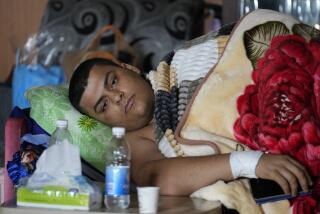Sadr loyalists protest new provincial official
- Share via
BAGHDAD — Followers of radical Shiite Muslim cleric Muqtada Sadr marched Monday south of Baghdad to protest the appointment of a provincial police chief they accuse of having links to a rival Shiite faction and to Saddam Hussein’s ousted government.
The demonstration in Hillah, capital of Babil province, underscored deep rivalries that threaten stability in the overwhelmingly Shiite south, generally one of the calmer parts of Iraq since the 2003 U.S.-led invasion.
Such regional divides are increasingly playing out on a national stage, where Sadr’s followers abandoned Prime Minister Nouri Maliki’s fragile government this year. The protest Monday resulted from Maliki’s appointment of Brig. Gen. Fadhil Radam Sultani to succeed Maj. Gen. Qais Hamza Mamouri, who was killed Dec. 9 in a bomb attack on his convoy.
In Baghdad, a bomb planted on a minibus killed two passengers and injured six in one of two explosions Monday that marred an otherwise largely peaceful day in the Iraqi capital.
More than 100 people participated in the Hillah protest, which was organized by Sadr’s office there. Fifteen members of the provincial governing council also submitted a letter urging provincial authorities to insist on a neutral police chief.
Mamouri’s assassination was the latest in a series of attacks against provincial leaders in southern Iraq, where Shiite factions and their militias are engaged in a bloody struggle for power and control over the region’s oil wealth.
Mamouri, who was viewed as independent, was praised for cracking down on militias and resisting pressure to release detainees linked to powerful political factions. Hours before his death, U.S. Army Col. Tom James had told reporters in Baghdad that Babil was lucky to have Mamouri.
Sultani does not have Mamouri’s commanding personality, and many residents fear he will be more easily manipulated.
Sadr’s followers and members of Maliki’s Islamic Dawa Party rejected Sultani’s appointment because he had served as an intelligence official in the holy city of Najaf under Hussein, who persecuted Shiite Muslims. They say Sultani’s term there coincided with the 1999 killing of Sadr’s revered father, Mohammed Sadeq Sadr.
Ahmed Massoudi, a Sadr loyalist and representative from Hillah in the Iraqi parliament, also accused Sultani of being linked to the Supreme Islamic Iraqi Council, led by rival Shiite cleric Abdelaziz Hakim. It is the dominant party in Maliki’s governing coalition.
Sultani, a religious man who served as Babil police chief for three months at the end of 2003, defended himself at a news conference Sunday, where journalists peppered him with questions about his past.
“I am an independent officer not affiliated to any political party,” he said. “I am ready to deal with all the political and religious sides because they are important in securing the province. . . . I don’t have problems with the Sadr movement.”
He acknowledged that he had served as director of intelligence in the Najaf police department during the 1990s, but said that his job was to investigate administrative corruption, “not to apply the oppressive decisions of Saddam.”
In Baghdad, police said the minibus bomb, hidden in a bag, exploded in the vicinity of the office of the Baghdad provincial governor, near the fortified Green Zone, home to the U.S. Embassy and Iraqi government headquarters.
Another bomb went off near a wall separating two strife-torn neighborhoods in southwest Baghdad, injuring six people, police said.
Two unidentified bodies were also recovered in the city, victims of execution-style slayings.
Police in neighboring Diyala province said gunmen posing as security personnel stopped a minibus near Muqdadiya and abducted its 14 passengers. There was no word on their fate.
The Iraqi capital has been enjoying one of the calmest periods since the first year of the war as Muslims continued to observe the Eid al-Adha holiday and the tiny Christian minority prepared to celebrate Christmas.
Thousands of people filled city parks on a bright, crisp day Monday. Security was tight. The road leading to Zawra Park, the city’s largest, was closed to vehicles and visitors were frisked before they were allowed inside.
Cardinal Emmanuel III Delly, leader of Iraq’s ancient Chaldean Church and the country’s first cardinal, celebrated midnight Mass in the late afternoon at the Church of the Virgin Mary because most residents hurry home soon after nightfall.
North of Baghdad, hundreds of worshipers filled the courtyard of the ancient Tahira Church near Mosul, where a huge bonfire was lighted and a marching band played. The region is home to many of Iraq’s oldest churches and has become a refuge for Christians fleeing violence in Baghdad and other parts of the country.
Preachers at both services appealed for unity so that the country’s more than 4 million displaced can return home.
The U.S. command says attacks have dropped 60% nationwide since its forces completed a 28,500-troop buildup in June. A rebellion by thousands of Sunni Muslim tribesmen against the militants they once backed and Sadr’s decision to freeze the activities of his Mahdi Army militia have been key factors in the downturn in violence.
--
Special correspondents in Baghdad and Hillah contributed to this report.
More to Read
Sign up for Essential California
The most important California stories and recommendations in your inbox every morning.
You may occasionally receive promotional content from the Los Angeles Times.










